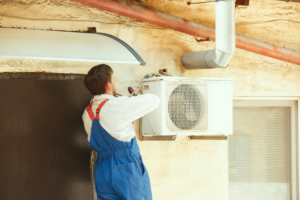A Breath of Fresh Air for Your Home
Understanding the Importance of Clean HVAC Lines
Your HVAC system is a complex network of ducts, vents, and lines that work together to keep your home comfortable. Over time, these lines can become clogged with dirt, dust, debris, and even mold. When HVAC lines become clogged, it can lead to a variety of problems, including:
- Reduced airflow: Clogged lines can restrict airflow, making it difficult for your HVAC system to heat or cool your home efficiently.
- Increased energy consumption: When your HVAC system has to work harder to overcome airflow restrictions, it consumes more energy.
- Poor indoor air quality: Clogged lines can trap allergens, pollutants, and other contaminants, leading to poor indoor air quality.
- Health problems: Breathing in poor indoor air can cause a variety of health problems, including allergies, asthma, and respiratory infections.
Signs of Clogged HVAC Lines
If you notice any of the following signs, it may indicate that your HVAC lines are clogged:
- Uneven heating or cooling: If you notice that some rooms in your home are hotter or colder than others, it could be a sign of clogged HVAC lines.
- Musty odors: A musty odor coming from your vents is a common sign of mold growth in your HVAC system.
- High energy bills: If your energy bills are higher than usual, it could be due to an inefficient HVAC system caused by clogged lines.
- Noisy HVAC system: A noisy HVAC system can be a sign of a variety of problems, including clogged lines.
The Clogged HVAC Lines Cleaning Process
A professional HVAC technician can clean your clogged lines using a variety of methods, including:
- Vacuuming: The technician will use a powerful vacuum to remove dirt, dust, and debris from your HVAC lines.
- Blowing: The technician may also use compressed air to blow out any remaining debris.
- Chemical cleaning: In some cases, the technician may use special chemicals to dissolve and remove stubborn buildup.
Benefits of Clogged HVAC Lines Cleaning
Regular HVAC line cleaning can provide a number of benefits, including:
- Improved indoor air quality: By removing allergens, pollutants, and other contaminants from your HVAC system, you can improve the air quality in your home.
- Increased energy efficiency: A clean HVAC system will operate more efficiently, saving you money on your energy bills.
- Longer HVAC system lifespan: Regular maintenance can help your HVAC system last longer.
- Improved comfort: A clean HVAC system will provide more comfortable heating and cooling.
How Often Should You Have Your HVAC Lines Cleaned?
The frequency of HVAC line cleaning will depend on several factors, including the age of your HVAC system, the condition of your home, and the number of pets and smokers in your household. As a general rule, it is recommended to have your HVAC lines cleaned every one to three years.
Choosing a Clogged HVAC Lines Cleaning Service
When choosing a clogged HVAC lines cleaning service, it is important to consider the following factors:
- Experience: Make sure the company you choose has experience cleaning HVAC lines.
- Qualifications: The technicians should be certified and have the necessary training to perform the job.
- Equipment: The company should have the proper equipment to clean your HVAC lines thoroughly.
- Customer reviews: Read online reviews to see what other customers have to say about the company’s services.
Conclusion
Regular HVAC line cleaning is essential for maintaining a healthy and comfortable home. By keeping your HVAC lines clean, you can improve indoor air quality, increase energy efficiency, and extend the life of your HVAC system. If you notice any signs of clogged HVAC lines, contact a professional cleaning service for a thorough cleaning.


